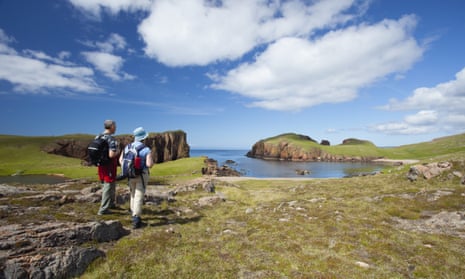Doctors in Shetland are to start prescribing birdwatching, rambling and beach walks in the Atlantic winds to help treat chronic and debilitating illnesses for the first time.
From Friday, doctors working in the 10 GP surgeries on the islands will be authorised by the archipelago’s health board, NHS Shetland, to issue “nature prescriptions” to patients to help treat mental illness, diabetes, heart disease, stress and other conditions.
Patients will be given calendars and lists of walks drawn up by the Royal Society for the Protection of Birds showing them particular bird species and plants, and suitable routes to take. The leaflets are to be available at surgeries.
Patients will be nudged to go hill walking on Shetland’s upland moors, and directed towards coastal paths to watch fulmars, to beachcomb for shells, draw snowdrops in February, and spot long-tailed ducks, oystercatchers and lapwings.
NHS Shetland is not suggesting that nature prescriptions will replace conventional medicines. Dr Chloe Evans, a GP who piloted the programme at Scalloway health centre on the west coast of Shetland’s main island, said it supplemented normal treatments.
“There are millions of different ways of doing medicine but we very much try to involve people in their own health, and people really like being empowered,” Evans said.
“People are always thinking at some level about their diet or exercise or stopping smoking but finding out what works for them is the key. The beauty about Shetland is it has this fantastic wild landscape.”
Helen Moncrieff, the area manager for RSPB Scotland, said that during winter the prescriptions would be “elemental”, where strong Atlantic winds would be the main feature.
Some people may be asked to take their hoods down and stand still and silent for three minutes, in a form of open-air mindfulness, for instance. The NHS leaflets were entitled “Nature your soul”, Moncrieff said.
“We would like this to be picked up by other areas or health boards. There is so much evidence that nature is good for us, and this is a simple way to get people outdoors and experiencing nature in a city or a wilder place like Shetland,” she said.
Doctors and hospitals elsewhere in the UK have been encouraged to suggest their patients take forest walks or get outside by the Centre for Sustainable Healthcare in Oxford. Its NHS Forest project aims to increase patients’ use of local parks and woodland near hospitals and health centres.
Makena Lohr, a spokeswoman for the centre, said she was not aware of any other NHS trusts or boards formally prescribing nature and exercise in this way. “The physical and mental benefits of connecting with nature have been very well evidenced by numerous studies,” she said. “It’s high time that the healthcare sector became aware of that.”
